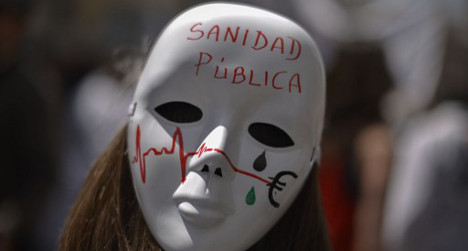Spain’s government placed the capital’s hospitals under the hammer last April despite numerous mass protests by doctors and patients alike who feel the move will put profits before people.
La Marea Blanca, or White Tide, as the anti-privatization movement is known, gathered again on Sunday in front of Spain’s Health Ministry to garner support for what up to know has been regarded as one of the world’s best public health systems.
“We’re fighting against what we believe will be irreparable damage to the health system,” Juan Ruiz, one of the platform’s spokespersons, told Spanish news agency Europa Press.
“It’s a dangerous move to try to buy off health professionals by offering them the chance to be shareholders.”
From September 2013, previously government-run health centres in Spain’s capital will be able to manage their own affairs like private clinics.
So far, six Madrid hospitals will start to operate as independent health clinics in two weeks’ time: Infanta Leonor, Hospital del Tajo, Infanta Cristina, Infanta Sofía, Sureste y del Henares.
Spain’s ruling Popular Party’s failed to awaken as much interest from potential buyers as originally anticipated.
Only British-owned Sanitas, Ribera Salud and Puerto Rican group HIMA San Pablo bought up the Madrid hospitals after the Spanish government drastically dropped the initial sale price.
Spanish health care workers and many patients fear the new law will put profits before quality and lead to the firing of thousands of support staff in favour of cheaper replacements.
Nationally, Prime Minister Mariano Rajoy's government has slashed health spending by €7 billion ($9.1 billion) a year as part of a campaign to squeeze €150 billion out of the crisis-racked country's budget by 2014.



 Please whitelist us to continue reading.
Please whitelist us to continue reading.
Member comments